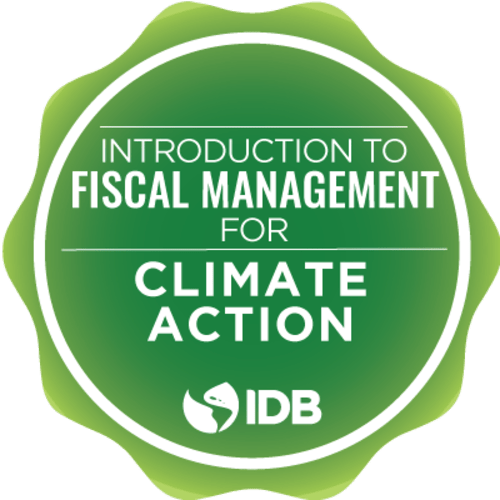Introduction to fiscal management for climate action
Puede obtener esta insignia si completa con éxito el curso.
SOBRE ESTE CURSO
This course explains the reasons why finance ministries are key players for confronting the climate crisis in Latin America and the Caribbean. By reviewing materials and undertaking activities, you will learn about the science and economics of climate change, the fiscal risks of climate events and the transition, and the role finance ministries can play by integrating climate action into policy and fiscal management.
AUDIENCIA DEL CURSO
- Perform tasks related to the fiscal policy and finances of your countries or regions.
- Have a basic understanding of environmental management.
- Be an advanced Internet user capable of searching, accessing videos, participating in discussion groups and forums etc.
- Have and manage a personal email account to receive notifications and be informed of course news.
COSTOS Y REEMBOLSOS
ESTRUCTURA DEL CURSO
- Identify the impacts of the risks from climate change and the transition for fiscal policies and management.
- Recognize the role of finance ministries in climate action, based on their areas of action and policy areas.
- Identify the opportunities for the just and inclusive transition to decarbonized and climate resilient economies.
- Identify how to help promote fiscal management of climate change in your context
1. The climate crisis in Latin America and the Caribbean
1.1 Climate change, causes and evidence.
- Climate change and its causes
- The evidence of climate change
1.2 Climate events and how they impact Latin America the Caribbean
- Types of climate events
- Impacts of climate change
- Vulnerability to climate change
- Socio-economic impacts of climate events
2. Global framework for confronting the climate crisis
2.1 The Paris Agreement and global action to confront the climate crisiscrisis.
- What is the Paris Agreement?
- The objectives of the Paris Agreement
- Implementation instruments of the Paris Agreement (NDC and LTS)
- The 1.5 °C and the COP26
- Implementation challenges of the Paris Agreement
2.2 The role of finance ministries in the climate agenda
- Key areas of intervention
1. Introduction
2. Risks of physical impacts from climate change and their fiscal implications
2.1 Physical risks
2.2 Fiscal impacts of physical risks
3. Risks of the transition to decarbonized and climate-resilient economies
3.1 Transition risks
3.2 Fiscal impacts of transition risks
4. The role of finance ministries for tackling the fiscal risks and impacts of climate change and the transition.
1. Introduction
2. Policy areas of finance ministries in the climate agenda
3. Climate action opportunities for fiscal management
